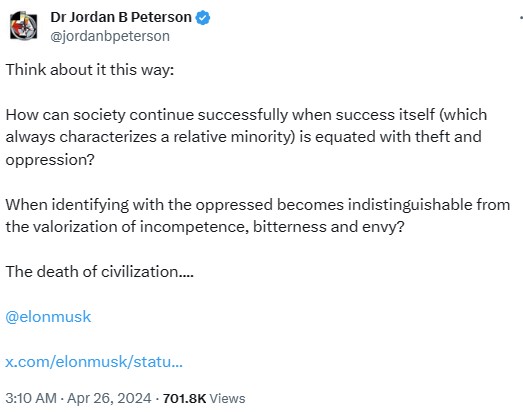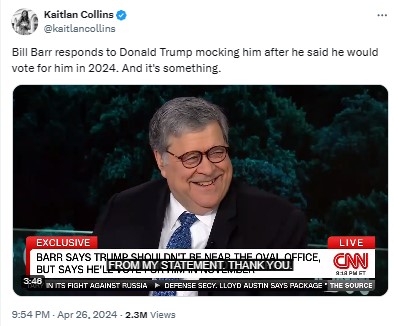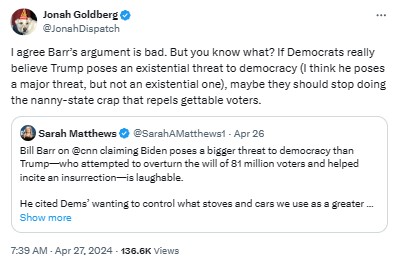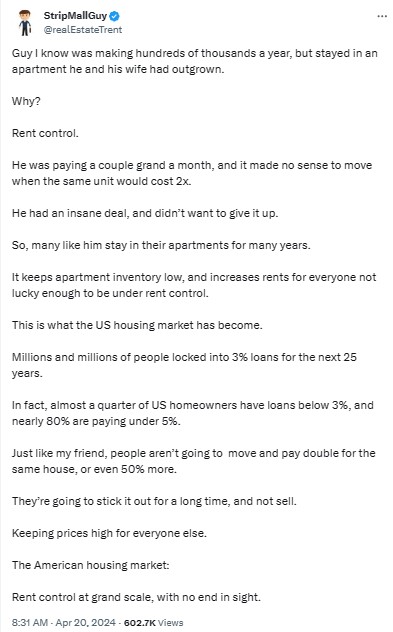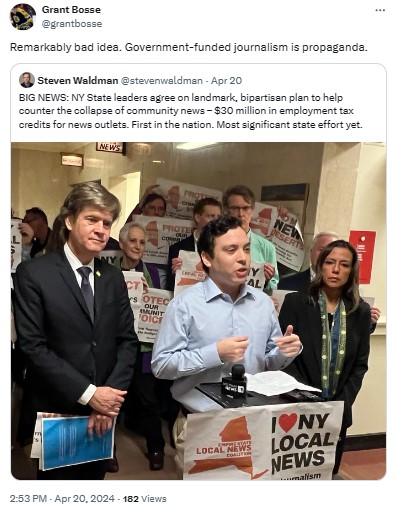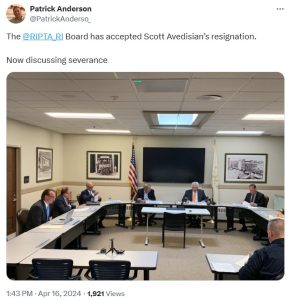That’s why, although I agree with Jordan, here, I think he’s a step away from the key point:
We must reframe. A libertarian lean is correct, but valorizing success won’t work. The impulse to identify with the oppressed has to be changed to wanting to help people, to make THEM successful. It’s the principle at the intersection of Christianity and free markets.
[Open full post]This exchange between CNN’s Kaitlan Collins and former U.S. Attorney General Bill Barr has made the rounds and received its share of commentary:
To my mind, the most telling part is when Collins looks for a comparison among conservatives to progressive bureaucratic government impositions and points to a local library debate. What Barr should have asked is: “Do you think you’ll have a better chance changing policies you don’t like in your hometown or in Washington, D.C.?”
The notion that different activities are appropriate at different levels of government is too often glossed over, and it’s central to our civic system. Arguably among the biggest contributors to growing division is the sense that progress means political questions are answered at higher and higher levels. In that view, it’s great if your local library board promotes your beliefs, but it’s even better if the federal government does, because it affects more people. That isn’t the pluralistic ideal of self-governance on which our country was founded.
[Open full post]On WNRI 1380 AM/95.1 FM, John DePetro and Justin Katz discuss:
- A picture of McKee traffic unseen
- Details of McKee’s plan proclaimed but not provided
- Superman bills yet to come
- Differentials in campaign announcement coverage
- The unions’ “captive audience”
- The DEI vampires on campuses
- State Police catch sight of Cranston politics
Featured image by Justin Katz using Dall-E 3 and Photoshop.
[Open full post]The concept of triangulation used to mean politicians looked at the political landscape and positioned themselves on the field to advance their policy goals. The worsening development, facilitated by mass media and social media, is the attempt to manipulate the landscape. That’s where we start to think of the Overton Window, shifting the range of positions people think are acceptable, and it’s what we see here:
I think Jonah misunderstands (or pretends to misunderstand) what’s going on, here. Democrats (among whom I count the mainstream media) promoted Trump and are doing everything they can to paint him as a monster because the worse they make him out to be the worse they can be. That’s why Barr is right that, in a binary decision, Trump is preferable, and not seeing it may be why Jonah has taken his wise reservations about Trump so far as to be an error.
[Open full post]And they’re both artificial thresholds created by interventionist policies. realEstateTrent makes a great point, here:
Progressive policies, which shift decision-making to the blunt tool of government, create these unhealthy thresholds everywhere. People stay on the public dole because they’d have to earn so much money for a job to be worthwhile that no job for which they’re qualified will suffice. They stay in houses that aren’t a good fit because the current arrangement is so sweet that the incremental benefit of a change is too small.
In a healthy system, you want to reduce friction from one step to the next and match effort (or risk) to reward so parties have continual incentive to improve. This is so obvious to anybody who thinks about it that one has to conclude the goal of those progressives who think about it is to stifle improvement for their own benefit.
Featured image by Justin Katz using Dall-E 3 and Photoshop AI.
[Open full post]One suspects mainstream journalists don’t see this as a problem because they can’t imagine reporting any differently just because the governments they support are directly paying them money:
And realistically, we’re finding in Rhode Island that government PR is such a lucrative next step for journalists that it’s more a question of whether they work for government sooner or later in their careers.
[Open full post]Catching up on email, I came across this October article from the American Stewards of Liberty about a federal push for conservation areas:
The Service is planning to acquire 250,000 acres of private land in the new federally designated area by offering “voluntary” conservation easements in perpetuity to landowners. Those who do not want to be a part of the program may not escape being targeted. The Service and its environmental organization partners have priority acquisitions in mind. And the agency has an array of regulations and restrictions they can deploy to encourage compliance.
The plan will allow the Service to use Land and Water Conservation Funds to purchase conservation easements in perpetuity on the private lands. Congress appropriates $900 million annually for this purpose as well as for direct acquisition of private lands. Property rights advocates would like to see this funding permanently rescinded as the government already owns 40 percent of America. These funds allow them to gain control over the remaining private lands.
Reviewing the above article, a friend reminded me that Tiverton gives a substantial portion of one of its revenue streams to an agency to buy up land. Some years ago, voters passed a budget resolution reducing the percentage to 10%, but (oops!) the town treasurer neglected to change the payment.
Out of curiosity, I went in search of data about public land ownership, finding this useful interactive tool. Probably because it was so well established by the time government began its land-grabbing practices, our region has largely escaped federal purchases, but public ownership still ads up. According to the associated charts, federal, state, and local governments own 13% of all land in Rhode Island, ranging from 16% in Washington County to just 8% in Bristol County.
That isn’t the whole story, though. In my county (Newport), 5% of privately owned land is locked up in conservation easements. That’s 3,196 acres. In Providence County, this number is 5,158 acres. Statewide, 113,151 acres are either owned by government or locked up in conservation easements. That land could accommodate a huge number of homes and apartments.
I’m definitely not suggesting Rhode Island should wipe away all of its open space, but with all the noise about housing, it’s strange one never hears about these numbers. The implied reason is familiar: The call to “fix” the housing crisis comes with sharp boundaries. Just like we have to “fix” education without reconsidering labor unions or progressive social engineering, we have to “fix” housing without noticing that governments are taking land off the market and making it difficult to build in other ways.
In these heavily proscribed prescriptions, we see the origin of the divisive us-versus-them corrupting our politics. People who want the power to tell other people how to live need the focus always to be on how much more the “haves” can give up, implying that they’re holding out and oppressing everybody else out of greed.
More likely than not, when they have control, the powerful will claim for themselves nice homes surrounded by open space and private views that can never be changed by the peasantry.
Featured image by Justin Katz using Dall-E 3 and Photoshop.
[Open full post]The headline of a Alexa Gagosz’s recent Boston Globe article asks, “Will tenants unions make a difference in Rhode Island’s housing crisis?” The answer, we can be confident, is “yes,” although it will make a difference by making it worse.
The state’s problem is insufficient housing, and the only durable, healthy way to give tenants, workers, or any group of people, more power is to give them more options. Using progressive-style union activism power creates disincentive for people to work together, and working together includes one person creating an apartment for another to rent.
A street protest against a big landlord will make people considering becoming landlords rethink. When the easy compromises are exhausted and landlords simply refuse demand, politicians will take it as an excuse to tighten the legal noose. That will lead to even less housing.
As with most policies, what’s needed is to think of both sides as human beings, to think of the incentives that govern their cooperative interactions, and to get constraints out of the way, not build up more hurdles and obstacles invented by politicians. They serve special interests (note that one of the elected representatives in the story is actually a union organizer) and have no expertise.
[Open full post]Here’s the Boston Globe’s description of the people leaving Massachusetts:
Boston Indicators, the research arm of the Boston Foundation, published an analysis exploring trends in so-called domestic outmigration in Massachusetts, or people leaving for elsewhere in the United States. Looking at a two-year average across 2021 and 2022, the analysis found that the people moving out of Massachusetts were predominantly white, middle- and high-income earners, and college-educated.
Particularly dire: Working-age adults are leaving in droves. On net, Massachusetts lost an average of 22,631 people ages 25 to 44 across 2021 and 2022 — the largest number of any age group and a marked increase over previous years, according to the report. For perspective, that’s about the size of the population of Winchester.
It’s been about 20 years since I started warning Rhode Island that our data told a similar story, and I coined the term “productive class.” Rhode Island and now Massachusetts are driving out precisely those people who move an area forward: those who are primed to transform their time and talents into productive activity.
Lose these folks and, as we’re seeing in precipitous experience in the Ocean State, you get the government plantations, which involves special interests using government to make government the areas core occupation by finding clients for government services and looking for excuses to bill other people. That model won’t last long, probably not even to the point that the mid-career special interests are ready to cash out and move to Florida.
[Open full post]Whatever one thinks of Avedisian, seeing Alviti in this picture is a reminder that state government incompetence can harm the lives of hundreds of thousands, but it’s the guy who leaves the scene of a fender bender who’s shown the door.
[Open full post]


